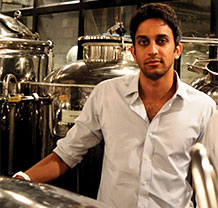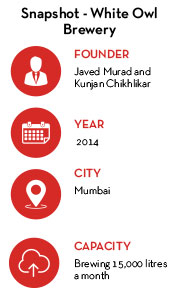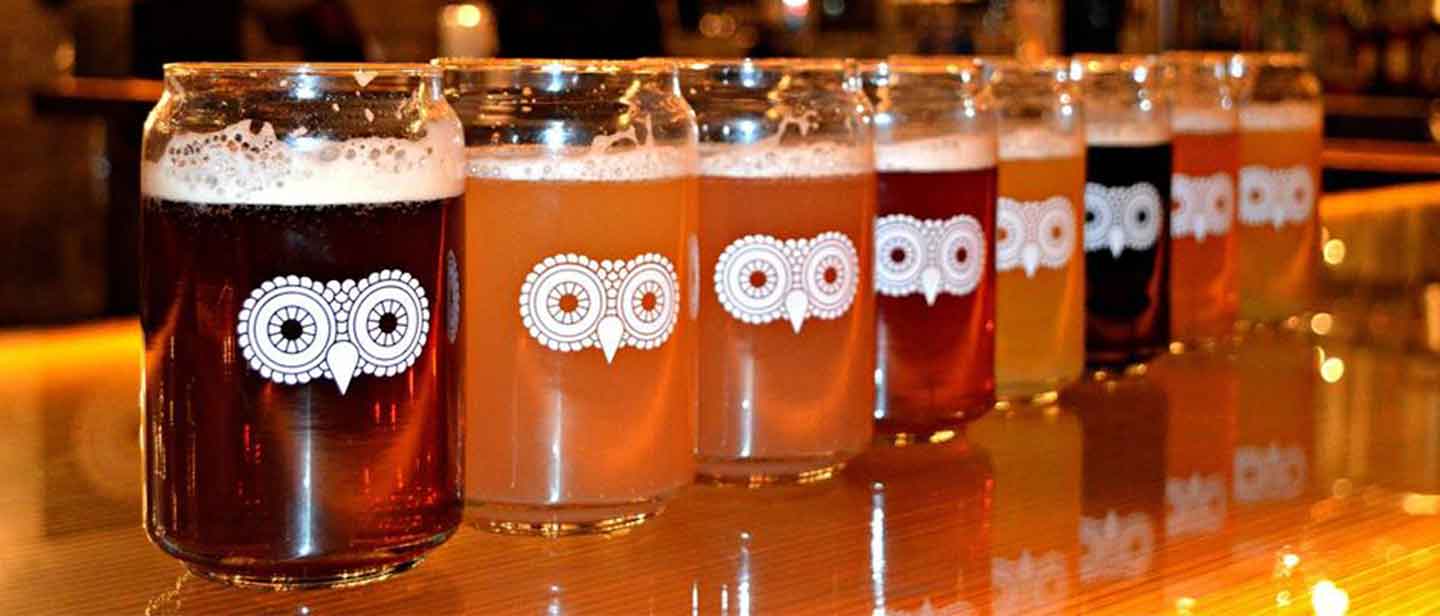Launched in October 2014 in Mumbai, White Owl Brewery has nipped the idea of a tap room model and instead, it’s focussing on selling its beer only in keggers. In terms of demand, its microbrewery in Lower Parel is already churning 15,000 litres a month, as against its stated capacity of 10,000 litres.

With the microbrewery scene in Mumbai scaling new heights, the timing couldn’t have been better for White Owl Brewery, the rather new entrant, to make a foray into this space. Founded in October 2014 by Javed Murad and Kunjan Chikhlikar, the brewery currently sells eight beer varieties, all in Kegs. While its sale initially began with big tanks, it eventually glided to 20-litre and now five litre Kegs, with the idea being that the smaller the Kegs, the larger the reach. In fact, when asked about having to compete with, say, a Independence Brewing and Gateway Brewing, or the city’s first microbrewery, The Barking Deer Brewpub, its founder, Javed Murad candidly admits that brewers have a collaborative approach towards life. “What sets us apart is the quality of our products. We source the best of raw materials and also keep our brewing team trained, engaged and give them ample opportunities to experiment with new tastes,” he notes.
The Founding Journey
The idea to found a brewery came to Murad when he was still in New York. “It was a time when the microbrewery scene was picking up there, and a lot more varieties of beer were available at affordable prices,” he recalls. When he moved to India in 2011, he was keen on replicating this model in the country, and hence, spent the initial years gauging the space through conversations with experts in the industry. “The options were not just about whether to setup a larger brewery or a microbrewery but also to determine where to set it up; in Goa, Bengaluru, Mumbai or Hyderabad,” he adds. Of course, the founder chose Mumbai despite its high taxations and price of alcohol because the State laws allow microbreweries to sell beer beyond restaurants and bars to other establishments as well. For example, if a brand wants to test the quality and acceptability of beer among its customers, it can do so across the State, by selling across various establishments, instead of selling from a single restaurant or tap room.
To investors who understand beer, consume and experience the product first hand, it’s an easy sell. In our case, when an investor happens to taste our brew, they approach us and tell us that they want to be a part of our next fund raise. These coincidences are unusual but good.
In terms of demand, Murad states that its small microbrewery in South Bombay is also brewing beyond its stated capacity. “It’s a 10,000 litre microbrewery and we’re already brewing 15,000 litres a month now. And, my brewers are working three shifts,” he states. While marketing is a huge challenge for alcohol brands, the founder explains that White Owl works around it by finding its way into events where the team can personally meet and interact with potential customers, giving them a chance to taste its brew. “Even retail for that matter is ruled out, because it’s still functional. Instead, we participate in events which have an element of music, shopping and lifestyle. We want to be in people’s face at these events, allow them to sample our beer, and have them come back if they like it,” he explains.
It’s No Easy Path
Close to three years into the venture, Murad recalls that setting up a business in this space was no cake walk. In his words, navigating through the regulatory hurdles is not an intuitive learning but one that comes with experience. “There are a lot of laws in play when you’re setting up a factory. And not to forget the taxes,” he says. A second challenge the company faced was in finding real estate for the brewery. “The balance is in finding a space with good infrastructure (power, water and such). There was a point when our beer was being received so well that we started asking ourselves; what are the ways in which we can expand our presence?” he recalls. But, the team quickly nipped the idea of doing a tap room model even though that was more profitable and reasonably scalable, and instead decided to take the keggers route. “We chose this because we realized there would be a point when we would tap out on real estate and we didn’t want to deal with that,” he admits.
 Exploring Further Expansions
Exploring Further Expansions
In October 2015, while White Owl raised Rs. 10 crore in initial funding from Amit Patni’s Family Office, RAAY, and Arihant Patni, to fund its supply of craft beer into third-party restaurants, Murad reveals that the company raised another round of undisclosed investments from a series of undisclosed investors to introduce bottled beers, set to launch in April 2017.
Talking about specific plans for the company in the coming years, Murad states candidly that he will explore opening breweries in six to seven markets such as New Delhi, Gurugram, Goa, Bengaluru and Hyderabad. “We also hope, by then, other markets evolve to become as effective as these, so that we can further expand our business,” he concludes.


